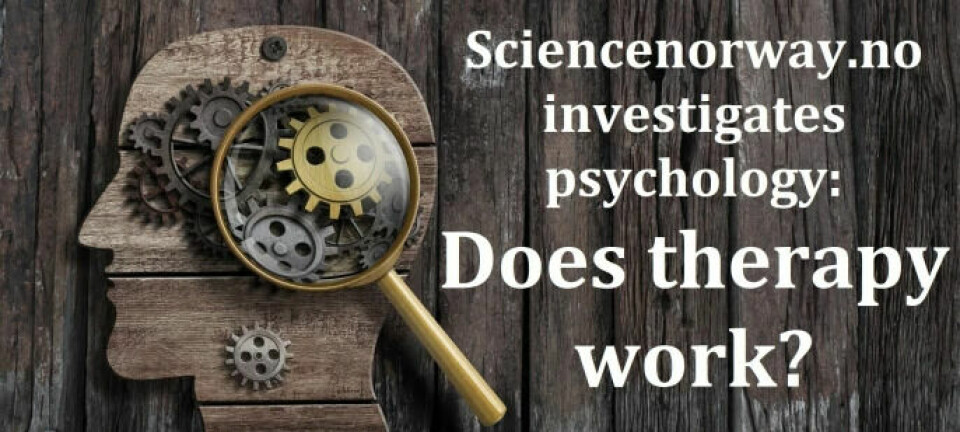
Five to ten percent of patients get sicker after seeing a psychologist
Some forms of treatment pose a greater risk of injury than others.
A common practice following a major crisis – such as an act of terrorism or an accident – has been to gather the individuals involved to let them talk about what they have just experienced. Preferably in detail.
One or more psychologists typically facilitate these debriefing conversations.
However, new studies indicate that this form of therapy may actually increase the risk of psychological problems like post-traumatic stress disorder (PTSD) rather than reducing it.
Psychologist Jørgen Flor and professor and psychologist Leif Edward Ottesen Kennair have co-authored the book Skadelige samtaler (Harmful conversations), in which they share their findings.
Condition worsens for 5 to 10 percent of patients
In a series of articles, sciencenorway.no takes a closer look at the field of psychology. We have interviewed researchers to find out what they say about the effects of psychotherapy.
The interviewees were in broad agreement that receiving psychotherapy treatment generally increases your chances of recovering or improving from a mental illness.
As to how big this effect is, however, experts do not agree at all.
What we were able to establish is that some individuals make a full recovery and many improve their condition. But not everyone benefits from seeing a psychologist.
“What’s less known is that between 5 and 10 percent of patients actually become worse in the course of therapy,” says Flor.
He and Kennair have arrived at this estimate from reading the research literature. This is a really difficult field to summarize and quantify, Flor says.
Therapy works
Flor believes that both research and therapists pay too little attention to the fact that some people get worse from therapy.
“Therapy works. It actually works so well that we sometimes have to be a little careful about how we use it,” Flor says.
He highlights debriefing as an example of how a psychological method can do more harm than good.
Yet for many years debriefing has been a recognized way to treat people who have experienced major trauma.
Natural to want to talk
It’s only natural to want to sit down and share our experiences when we’ve gone through something terrible, says Flor.
“But based on what we know today about memory, it’s better not to participate in a debriefing after an unpleasant experience,” he says.
“Sharing what you’ve experienced in detail strengthens the experience so you will also remember it better. And the main problem with PTSD and trauma is that you remember things you’d rather not,” Flor says.
Based on the current understanding about memory, therapy should go in the complete opposite direction in such cases. A Cochrane summary concluded already in 2002 that debriefing did not work.
“We’ve long had empirical evidence showing that anyone who has experienced something terrible should sit quietly and consider the symptoms. The professionals should matter-of-factly provide information after the incident. The patient should be sent home with instructions to avoid sleeping too much. We know that sleep strengthens memories,” says Flor.
Uncomfortable research
Flor became interested in the adverse effects of therapy when he was writing his master's thesis in psychology at NTNU. In interviewing several psychologists, he found they had little awareness that therapy could also harm patients.
That is when he became seriously interested in the harmful effects of therapy. He went to the research, where he found many studies on the positive effects of talk therapy, but very little research on the harmful effects.
Flor believes that studying negative effects isn’t that much more difficult than studying positive ones.
“The difficult part is that psychologists find the topic uncomfortable to research,” he says.
Little awareness of side effects

We are well aware that medications have side effects. And we are very aware of the importance of documenting that they are not actually dangerous before we use them, says Joar Øveraas Halvorsen, a clinical psychologist and associate professor at NTNU.
But there is little awareness of the fact that talking can be harmful, he says.
“There’s relatively little focus on or awareness of the side effects or harmful effects of psychotherapy. Certainly quite a few psychologists are aware of this, but psychotherapy is more often presented as a form of treatment that has no side effects,” he says.
Can do whatever you want
Pharmaceutical companies have to document that their medications are effective and that they are not harmful before they are allowed to market them.
Psychotherapy is not regulated in the same way as pharmaceutical research.
Nor can drug research be conducted without reporting adverse effects. Psychotherapy has no requirement to register side effects or adverse outcomes.
“Psychotherapy is not regulated at all in Norway. The only thing that’s regulated is my professional authorization. Once I have it, I can do almost anything I think is beneficial,” Halvorsen says in another article in this series that examines the subject of psychology.
Repressed memories
The strict regulation of medications for physical illnesses came about through historical events that caused the authorities to step in and regulate them, according to Halvorsen.
We can also find examples of practices in psychotherapy that should have contributed to treatment being regulated, he believes.
A few decades ago, a number of American patients and their families were traumatized by their therapists.
In their psychology sessions, the patients suddenly ‘remembered’ dramatic abuses from their childhood that they had apparently repressed.
The idea soon leaked out of the therapy room and quickly spread in both the United States and Europe.
Suddenly we knew that, in principle, anyone might have experienced horrible things, without remembering anything. And even worse – we could have committed barbaric acts. You can read more about the topic in this article in our psychology series.
In some cases, these ‘recollections’ had major consequences, as in the infamous Birgitte Tengs case. Tengs’ cousin insisted that he could not remember killing his cousin. But investigators said he could have repressed the memory, and eventually they managed to convince the boy that he must have committed the murder but then forgotten about the incident. He was convicted but later acquitted.
Do we really have to talk about everything?
Flor doesn’t believe that psychologists are still practising this type of therapy. But he cannot know for sure.
“That’s part of the problem in our profession. As a therapist, you can sit in an office tucked away somewhere and do lots of weird things that no one has access to,” he says.
Most viewed
However, Flor is sure that many people still harbour as an ideal that it is important to uncover events that have happened and subsequently forgotten.
But isn’t it a good idea to talk to someone about unpleasant things that have happened to us in life?
“No, not always,” says Flor. “Sometimes talking about them can make the pain worse. Talking about them in the wrong way, with the wrong people or at the wrong time can make matters worse. There are a lot of good reasons to not talk or to wait.”
Negative feedback from colleagues
Flor admits that he has received some negative feedback from colleagues because he has focused on the adverse effects of psychotherapy.
“Some colleagues actually told me that it’s not good to scare people away from therapy. I find that foolish. I think most people get this because it's so obvious. After all, we take medicine even if it can have side effects.”
He believes that the field of psychology would have a lot to gain by talking openly about these issues. That would increase the credibility of the psychology profession, Flor says.
“A new study shows that the therapeutic alliance between patient and therapist improves if the therapist talks to the patient about potential risks and harmful effects. We’re talking about ethics. And about law. I believe it’s important to inform patients about the risks and side effects of any treatment.”
Need to free patients
We can’t rely on patients speak up themselves, says Flor.
Patients who get worse don’t quit therapy. If they don’t feel they’re being helped, they tend to blame themselves instead, he says.
“We need to free our patients so they understand that some therapies and some therapists aren’t a good fit for them.”
References:
Flor, J. A., & Kennair, L. E. O: Skadelige samtaler: myten om bivirkningsfri terapi (Harmful conversations: the myth of side-effect-free therapy). Tiden Norsk Forlag, 2019 (in Norwegian)
Flor, J.: De har i alle fall ikke blitt dårligere, har jeg trodd: en kvalitativ studie av psykologers perspektiv på forverring i terapi. (At least they haven't gotten worse, I thought: a qualitative study of psychologists' perspectives on deterioration in therapy.) Hovedoppgave ved / Master’s thesis at NTNU, 2016. (in Norwegian)
Amble, Ingunn et al: The effect of implementing the Outcome Questionnaire-45.2 feedback system in Norway: A multisite randomized clinical trial in a naturalistic setting. Journal of the Society for Psychotherapy Research, 2015.
Cuijpers, P., et al: Negative effects of psychotherapies for adult depression: A meta-analysis of deterioration rates. Journal of Affective Disorders, 2018.
Ulf Jonsson, et al: «Adverse effects of psychological therapy: An exploratory study of practitioners, experiences from child and adolescent psychiatry». Clin Child Psychiatry, 2016.
Lambert, M. J: Maximizing psychotherapy outcome beyond evidence-based medicine. Psychotherapy and psychosomatics, 2017.
Warren, J., Nelson, P. & Burlingame, G. Identifying Youth at Risk for Treatment Failure in Outpatient Community Mental Health Services. Journal of Child and Family Studies, 2010.
———
Read the Norwegian version of this article at forskning.no







































